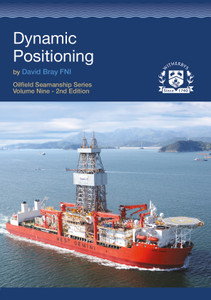
This book provides CPD exercises, level, frequency and methodology to deliver supervised, structured onboard CPD training.
The CPD covers familiarisation with the vessel and the vessel-specific DP system, DP operation, DP maintenance and emergency drills.
Written by an industry expert with two decades of experience on board dive vessels and teaching Dynamic Positioning, this comprehensive guide outlines how to develop and sustain competence.
Preface
The standard of DP training at shore-based training centres has taken a quantum leap in the last decade. However, continuum of DP competence for key DP personnel on board, known as ‘continuous professional development’ (CPD), is left to individual companies, and requires streamlining.
MSC.1/Circ.738/Rev.2 – Guidelines for Dynamic Positioning System (DP) Operator Training sets out how to develop and sustain competence. To achieve the objectives of the Guidelines, this book provides CPD exercises, level, frequency and methodology to deliver supervised, structured onboard CPD training. At the end of the CPD training, the participants are assessed to determine their suitability for the job and the need for refresher training, if any.
Broadly, key DP personnel are divided into two categories, DP operators and technical DP personnel. The CPD covers familiarisation with the vessel and the vessel-specific DP system, DP operation, DP maintenance and emergency drills. The desired skill level and frequency varies with the category and rank of the DP personnel.
Mentoring by senior DP professionals plays an important role in achieving the CPD objectives. Mentoring in the onboard environment remains a challenge due to the short tenures and lack of instructional training of senior DP personnel. Vessel owners should foster a positive environment to achieve this. To optimise CPD training, the training sessions should be conducted with maximum participation in a classroom-like environment followed by a debrief.
IMO, IMCA, The Nautical Institute, MTS, DNV (formerly known as DNV GL) and various class societies provide DP-related references, guidelines and DP safety reports online, which must be accessible during the CPD training.
I hope this book, in conjunction with ‘Dynamic Positioning, Theory & Practices’, will help maintain the required knowledge and skill continuum.
Capt KC Shukla
1. Introduction
1.1 Definitions
1.2 Training of Key DP Personnel
1.3 DP Competence and CPD
1.4 Manning Personnel
1.5 Competence Assessment
2. Vessel-specific Competence
2.1 The Guidance
2.2 Vessel Familiarisation
2.3 DP Theory
2.4 DP System Familiarisation
2.5 DP Planning
2.6 DP Safety Reports
2.7 DP Vessel Operation
2.8 DP System Maintenance
2.9 DP Emergency Drills
2.10 DP Knowledge Repository
3. CPD Training Methodology
3.1 CPD Training
3.2 Training Plan
3.3 Training Records
3.4 Qualified Trainer
3.5 CPD Training Aids
3.6 The Methodology
3.7 Debriefing
3.8 Assessment
3.9 Verification
4. CPD Training-Need Analysis
4.1 Factors Affecting CPD Training
4.2 The Training-Need Analysis
5. MSC.1/Circ.738/Rev.2 – Guidelines for Dynamic Positioning System (DP) Operator Training
1 Executive Summary
2 Glossary of Terms and Abbreviations
3 Introduction
3.1 Background
3.2 Operational Conditions
4 Aim and Objectives
4.1 Aim
4.2 Objectives
5 Key DP Personnel Identified
5.1 Master/OIM
5.2 Senior DP Operator (SDPO)
5.3 DP Operator (DPO)
5.4 Chief Engineer
5.5 Senior Engine Room Watchkeeper
5.6 Engine Room Watchkeeper
5.7 DP Electrical and Electronics Technicians
5.8 Company DP Authority
6 DP Training
6.1 Types of Training
6.2 Training Records
6.3 Training Courses & Certification for DPO Personnel
6.4 Training Courses for Key Technical DP Personnel
6.5 Training Courses for Other Personnel Involved in DP Operations
7 Qualification and Knowledge Requirements of Key DP Personnel
7.1 Master/OIM
7.2 Senior DPO
7.3 DPO
7.4 Chief Engineer
7.5 Senior Engine Room Watchkeeper
7.6 Engine Room Watchkeeper
7.7 DP Electrical and Electronics Technicians
7.8 Company DP Authority
8 Recommended Vessel Experience of Key DP Personnel
8.1 Recommended Minimum Experience on an Established DP Operational Vessel
8.2 Recommended Minimum Experience on a New or Unfamiliar Vessel
8.3 Minimum Period of Familiarisation on a Familiar Vessel
9 DP Vessel and Industrial Mission Familiarisation
9.1 Procedure
9.2 Current Project Familiarisation
10 Key DP Personnel Continuous Professional Development (CPD)
10.1 CPD Definition
10.2 DP Competency and CPD
10.3 DP Refresher Training
10.4 Maintaining Personal Performance
Appendices
Appendix A – Vessel Familiarisation
Appendix B – DP Theory
Appendix C – DP System Familiarisation
Appendix D – Operational Activity Planning
Appendix E – DP Station Keeping Review
Appendix F – DP Vessel Handling
Appendix G – DP Operation
Appendix H – DP System Maintenance
Appendix I – DP Emergencies
Appendix J – Mentoring
Appendix K – Debriefing
Appendix L – CPD Master Record
Witherbys
Witherbys titles are developed using scripts developed by technical experts that are peer reviewed within work groups. Typically, they seek to improve understanding of the regulations, recommendations and guidelines issued by Industry.
Witherbys staff have significant expertise in the fields of navigation and hazardous cargoes as well as in the presentation of complex subjects in a graphic and easy to understand manner.
Captain KC Shukla
Captain KC Shukla is a visiting lecturer in DP at the Korea Maritime and Ocean University, Busan and MT–Marine Technologies Center, Singapore and provides support to DP Nautical Ltd, UK. He has worked on board diving support vessels and offshore oil fields and has experience in offshore maintenance and construction projects.
In 2008, he was invited to join the C-MAR Group as DP faculty, where he continued until 2016. During this period, he was actively involved in the improvement of the DP curriculum and authored the ‘DP Simulator Course Manual’ for the Group.
- Number of Pages:
- 88
- ISBN:
- 9781856099912
- Book Height:
- 280 mm
- Book Width:
- 170 mm
- Weight:
- 0.6 kg
- Author:
KC Shukla
- Published Date:
- September 2021
- Preview:
- Yes
- Publication Date:
- September 2021






